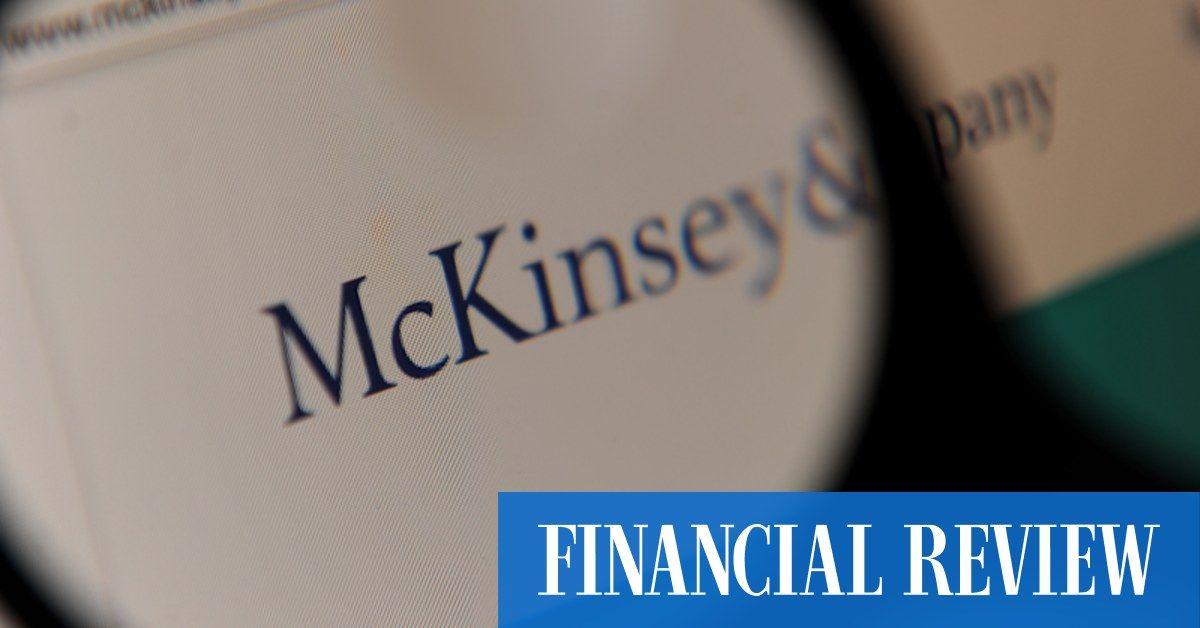McKinsey Leverages AI to Streamline Junior-Level Tasks, Boosting Efficiency
3 Sources
3 Sources
[1]
McKinsey Leans On AI to Make PowerPoints Faster, Draft Proposals
McKinsey & Co.'s consultants are increasingly drafting proposals and making PowerPoint slides using the firm's generative artificial intelligence platform, which has developed enough to take over at least some of the tasks typically performed by junior employees. While employees have access to the likes of OpenAI's GhatGPT, they can only input confidential client data into Lilli, the proprietary platform aggregating McKinsey's knowledge base, according to Kate Smaje, the company's global leader of technology and AI.
[2]
McKinsey leans on AI to do junior workers' tasks
New York | McKinsey's consultants are increasingly drafting proposals and making PowerPoint slides using the firm's generative artificial intelligence platform, which has developed enough to take over at least some of the tasks typically performed by junior employees. While employees have access to the likes of OpenAI's ChatGPT, they can only input confidential client data into Lilli, the proprietary platform aggregating McKinsey's knowledge base, according to Kate Smaje, the company's global leader of technology and AI.
[3]
McKinsey Is Using AI to Create PowerPoints and Take Over Junior Employee Tasks: 'Technology Could Do That'
McKinsey consultants are using the firm's proprietary AI platform to take over tasks that have traditionally been handled by junior employees. Kate Smaje, McKinsey's global leader of technology and AI, told Bloomberg on Monday that McKinsey employees are increasingly tapping into Lilli, the internal AI platform the firm launched in 2023. While employees are permitted to use ChatGPT internally, Lilli is the only platform that allows them to input confidential client data safely. Related: Salesforce Has Used AI to Reduce Personnel Costs By $50 Million This Year. Here's Which Roles Are Affected. Over 75% of McKinsey's 43,000 employees are now using Lilli monthly, Smaje disclosed. Lilli was named after Lillian Dombrowski, the first woman hired by McKinsey in 1945. Through Lilli, McKinsey consultants can create a PowerPoint slideshow through a prompt and modify the tone of the presentation with a tool called "Tone of Voice" to ensure that the text aligns with the firm's writing style. They can also draft proposals for client projects while maintaining the firm's standards, find internal subject matter experts, and research industry trends. Lilli has advanced enough to take over tasks typically assigned to junior employees, but Smaje says that doesn't mean McKinsey is going to hire fewer junior analysts. "Do we need armies of business analysts creating PowerPoints? No, the technology could do that," Smaje told Bloomberg. "It's not necessarily that I'm going to have fewer of them [analysts], but they're going to be doing the things that are more valuable to our clients." McKinsey told Business Insider that Lilli was trained on the firm's entire intellectual property, encompassing over 100,000 documents and interviews across the firm's nearly 100-year history. McKinsey employees who use Lilli turn to it 17 times per week on average, a McKinsey senior partner told BI. A case study published on McKinsey's website shows that Lilli answers over half a million prompts every month, saving workers 30% of the time they would have spent on gathering and synthesizing information. Related: The CEO of $61 Billion Anthropic Says AI Will Take Over a Crucial Part of Software Engineers' Jobs Within a Year Consulting firms have been tapping into AI for years. Bain consultants have access to Sage, an AI chatbot powered by OpenAI. At Boston Consulting Group, employees use an AI tool called Deckster to fine-tune their PowerPoint presentations. Meanwhile, at other companies, AI is taking over tasks once completed by human workers. IBM CEO Arvind Krishna said last month that the company replaced hundreds of human resources staff with AI, then used the freed-up resources to hire more programmers and salespeople. A report from SignalFire, a venture capital firm that tracks over 650 million employees on LinkedIn, found that new graduates accounted for just 7% of new hires in 2024 at big tech companies, down 25% from 2023, as AI takes over entry-level tasks.
Share
Share
Copy Link
McKinsey & Co. is increasingly using its proprietary AI platform, Lilli, to automate tasks traditionally performed by junior employees, such as creating PowerPoint presentations and drafting proposals.
McKinsey's AI Revolution: Lilli Takes Center Stage
McKinsey & Co., one of the world's leading consulting firms, is making significant strides in integrating artificial intelligence into its daily operations. The company's proprietary AI platform, Lilli, is increasingly taking over tasks traditionally performed by junior employees, marking a notable shift in how the firm operates
1
.
Source: Financial Review
Lilli: McKinsey's AI Powerhouse
Named after Lillian Dombrowski, the first woman hired by McKinsey in 1945, Lilli is a generative AI platform that aggregates McKinsey's vast knowledge base
3
. The platform has been trained on the firm's entire intellectual property, encompassing over 100,000 documents and interviews across McKinsey's nearly 100-year history.Key capabilities of Lilli include:
- Creating PowerPoint slideshows from prompts
- Drafting client project proposals
- Finding internal subject matter experts
- Researching industry trends
Widespread Adoption and Impact
The adoption of Lilli within McKinsey has been remarkable. Over 75% of McKinsey's 43,000 employees now use Lilli monthly, with the average user turning to it 17 times per week
3
. This widespread use has led to significant efficiency gains, with Lilli answering over half a million prompts every month and saving workers 30% of the time they would have spent on gathering and synthesizing information.Balancing AI and Human Roles
While Lilli has advanced enough to take over tasks typically assigned to junior employees, McKinsey maintains that this doesn't necessarily mean fewer junior analysts will be hired. Kate Smaje, McKinsey's global leader of technology and AI, explains, "Do we need armies of business analysts creating PowerPoints? No, the technology could do that. It's not necessarily that I'm going to have fewer of them [analysts], but they're going to be doing the things that are more valuable to our clients"
2
.
Source: Bloomberg
Data Security and Confidentiality
A crucial aspect of Lilli's implementation is its role in maintaining client confidentiality. While McKinsey employees have access to public AI tools like OpenAI's ChatGPT, they are only permitted to input confidential client data into Lilli
1
. This approach ensures that sensitive information remains within McKinsey's secure ecosystem.Related Stories
Industry-wide AI Adoption
McKinsey's use of AI is part of a broader trend in the consulting industry. Other major firms are also leveraging AI to enhance their services:
- Bain consultants use Sage, an AI chatbot powered by OpenAI
- Boston Consulting Group employs Deckster, an AI tool for refining PowerPoint presentations [3](https://www.entrepreneur.com/business-news/ai-creates-powerpoints-at-mckinsey-replacing-junior-workers/492624]
Implications for the Job Market
The integration of AI into high-level consulting work raises questions about the future job market, particularly for entry-level positions. A report from SignalFire found that new graduates accounted for just 7% of new hires in 2024 at big tech companies, down 25% from 2023, as AI takes over entry-level tasks
3
. This trend suggests a potential shift in the skills and roles valued in the evolving AI-driven workplace.References
Summarized by
Navi
[2]
Related Stories
McKinsey tests graduates on AI tool Lilli as firm deploys 20,000 agents alongside human staff
14 Jan 2026•Business and Economy

McKinsey Predicts AI Boom to Revitalize Consulting Industry After Slump
14 Aug 2024

OpenAI's Project Mercury: AI Poised to Revolutionize Entry-Level Banking Tasks
21 Oct 2025•Business and Economy

Recent Highlights
1
Samsung unveils Galaxy S26 lineup with Privacy Display tech and expanded AI capabilities
Technology

2
Anthropic refuses Pentagon's ultimatum over AI use in mass surveillance and autonomous weapons
Policy and Regulation

3
AI models deploy nuclear weapons in 95% of war games, raising alarm over military use
Science and Research





